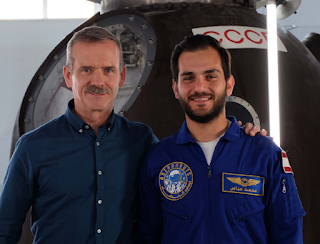What Is the Difference Between Astronomy and Astrophysics?
It's easy to think that astronomy and astrophysics are just synonyms, but they have several key differences. Astronomy is the study of stars and planets, galaxies, and other matter that can be seen from Earth. Astrophysics is the study of the physical nature of such objects that can't be observed from Earth with visible light, such as black holes and dark matter:
According
to Dr. Mohamad Abbas, the field of astronomy has been around longer.
Astronomy is a branch of physics, a word that refers to the measurable
properties of matter at all levels. Astrophysics isn't limited to observations
made from Earth; it also involves observations made from outer space by
telescopes such as NASA's Hubble Space Telescope and the European Space
Agency's Herschel Space Observatory.
Both
astronomy and astrophysics involve several subdisciplines that represent
different ways of looking at objects in space. These include observational
astronomy, which involves observation and categorization of objects in space;
theoretical astrophysics, which involves mathematical modelling of the same
objects; and others such as exoplanet ology and planetary science.
The
field that is most often referred to as astrophysics began in the mid-1800s and
was then known as physical astronomy. It began to separate from observational
astronomy in the early 1900s.
Astronomy is a branch of atmospheric physics, while astrophysics is a branch of cosmology and particle physics. Astrophysics is also the study of celestial objects that can't be observed from Earth with visible light. Astronomy might not consider these objects as real and worthy of study, but they are. For example, astronomers are working to observe an entire population of brown dwarf stars and extrasolar planets that aren't visible at all wavelengths other than ultraviolet, infrared, or radio. Astronomers generally do not use the term astrophysics about such objects. Instead, they refer to them as objects of interest.
Astrophysics vs. Astronomy
Astrophysics
is the study of the behavior and nature of the matter in the Universe and its
interaction with energy on all scales. The term comes from the same root as
"astronomy", but it's no longer interchangeable with it: while
both are branches of physics, astrophysics is related to cosmology and particle
physics, while astronomy is related to atmospheric physics. Astronomers observe
astrophysics from Earth, while astrophysicists are based in space.
Astronomy,
on the other hand, is the study of objects and matter in space, including all
celestial bodies such as planets, moons, stars, galaxies, and nebulae.
Astronomers carry out their research using several techniques to determine the
characteristics of these objects.
Although
the terms are often used synonymously, there is a clear difference between
astronomy and astrophysics, in both definition and practice. For example, at
the University of Texas at Austin – where both astronomy and
astrophysics are taught – the former is defined as "the study of objects
and matter outside the Earth's atmosphere", while the latter is described
as "the study of processes originating from forces other than
gravitation".
Another key difference between the two is that astronomy is a branch of physics, while astrophysics is not. Astronomy is also related to atmospheric physics, although the two are concepts entirely separate from each other.
The History of Astronomy and Astrophysics
Astronomy and astrophysics have been studied for centuries, although the
distinction between them is relatively recent. It was made in the early 20th
century at the University of Chicago, where the Department of Astronomy was
divided into two parts – astronomical physics and astrophysics.
Up
until that point, as is sometimes still seen in many educational institutions
around the world today, astronomy and astrophysics were taught as two parts of
one subject. In some cases, university departments still retain this
designation. It is possible to study astronomy without studying astrophysics,
but it is not possible to study astrophysics without studying astronomy.




Comments
Post a Comment